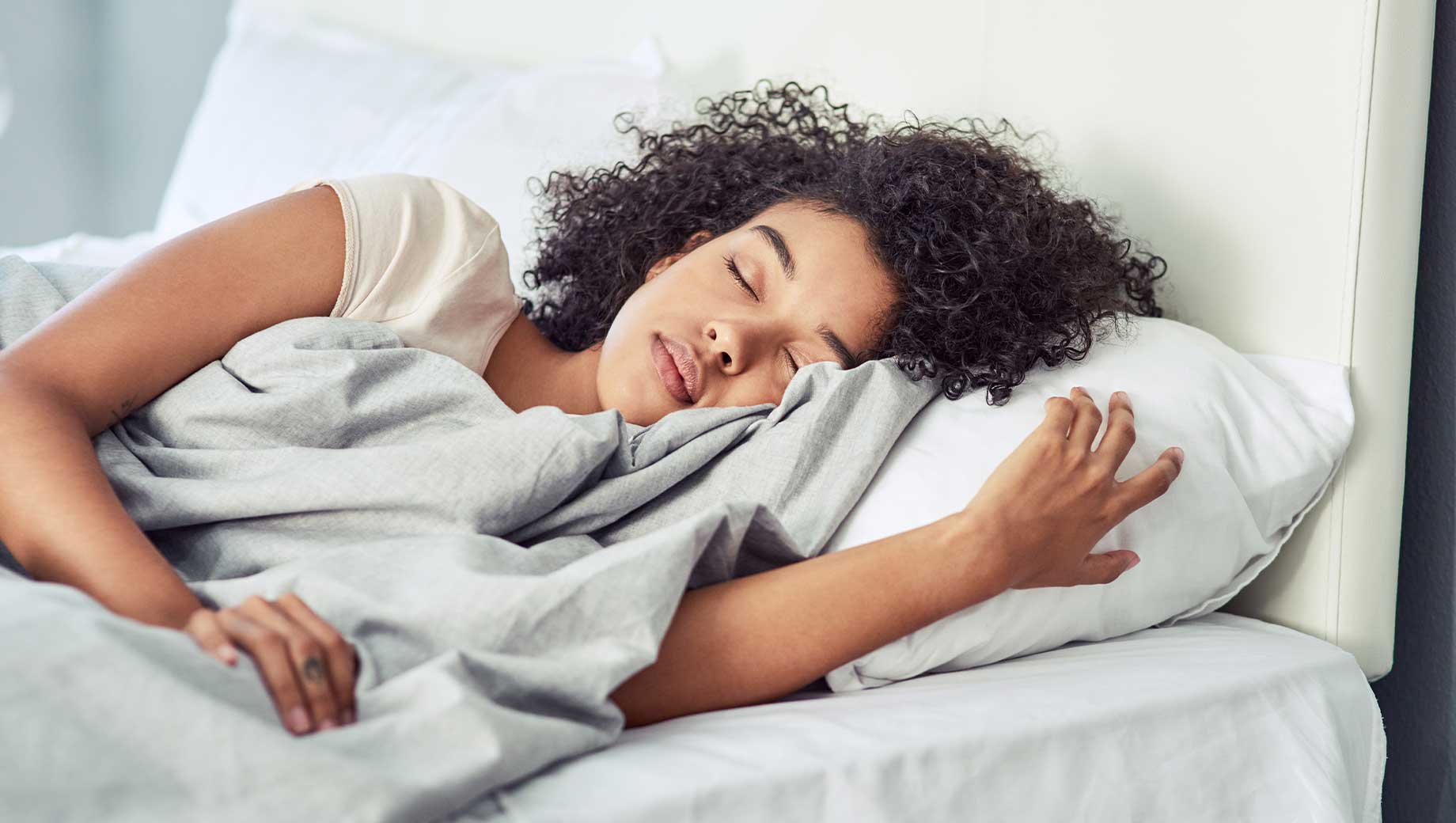6 Ways Sleep Deprivation Affects Work Performance

Poor sleep affects nearly everyone. In fact, according to recent CDC estimates, ⅓ of U.S. adults don’t get enough sleep, (1) with 68% of adults suffering from sleep issues about once a week. That equates to about 164 million people. What’s more, 27% have trouble falling or staying asleep most nights. (2)
When you consider just how staggering these numbers are, it makes sense that workdays are lost due to sleep inefficiencies—1.2 million workdays, to be exact. And get this: researchers estimate that when you add up the costs of reduced productivity, motivation, and healthcare due to fatigue, it comes out to $1,967 per year, per employee. (3) In sum, that’s a whopping $136.4 billion a year that U.S. companies have to dish out to compensate for the side effects of insufficient sleep. (4)
Continue reading to discover the science behind how poor sleep habits and sleep deprivation affect job performance, followed by expert tips on what you can do to promote better sleep (and thus better physical health, mental health, and overall wellness).
1. Sleep + productivity
Poor sleep leads to next-day feelings of fuzziness that make it difficult to focus during work hours. No surprise there. But according to a study published in BMJ Journals, (5) the effects of sleep deprivation in terms of cognitive impairment are equivalent to legally prescribed levels of alcohol intoxication. Here are the hard numbers:
- 17-19 hours awake is equivalent to a blood alcohol level of 0.05%
- 20 hours awake is equivalent to a blood alcohol level of 0.1%
“The overall implications of the results of this study are clear,” write researchers. “They show that the effects on performance of moderate periods of being awake cannot be discounted. Sleep is needed after the end of a day if adverse effects on performance are to be avoided.”
2. Sleep + patience
Working collaboratively with co-workers often requires patience, which may be hard to come by after a poor night’s sleep. Various studies on the emotional impact of sleep deprivation have found that it can lead to short-term feelings of irritability and anger, along with increased susceptibility to stress. (6) Combine that with the fact that sleep loss causes emotional reactions to become amplified (7) and what you get is a recipe for strained relationships with colleagues, especially when the inevitable deadlines are missed or roadblocks are encountered.
Interestingly, a 2017 study on the effects of sleep on “leader-follower” relationships found that individuals are generally unaware of the impact of their lack of sleep on people’s perceptions of relationship quality, thus suggesting that both managers and direct reports may be unknowingly damaging their relationship. (8)
3. Sleep + focus
Poor sleep impairs cognitive performances that depend on the optimal functioning of our brain’s prefrontal cortex. This can manifest as decreased alertness and attention, specifically attention lapses (i.e. brief moments of inattentiveness) and slowed responses. While it was once assumed that, in between the lapses, cognitive performance would remain somewhat intact, studies have shown that’s actually not the case and that the slowing of cognitive processing can occur independent of “lapsing.” (9)
Work performance as it relates to focus deteriorates most significantly with long, simple, and monotonous tasks.
4. Sleep + decision making
In a sleep deprived state, people who may typically be on the reflective side tend to gather less evidence prior to making a decision, and those who are classified as “cautious” tend to become more prone to risk-taking. Note that this doesn’t typically happen after just one night of poor sleep but rather prolonged sleep deprivation (i.e. 5+ consecutive nights). (10)
5. Sleep + creativity/problem solving
During REM (or rapid eye movement) sleep, brain waves are far more active, although muscles remain fully relaxed—which is a good thing! This is the prime time for dreams to occur, and we don’t want to be acting those out. This stage, which we spend 20 – 25% of our time in, benefits cognitive functions such as memory consolidation (more on that below), learning, and creativity.
The “behind-the-scenes” work that’s done at night helps integrate otherwise unassociated knowledge in order to help you recognize patterns, form insights, and come up with innovative ideas, solutions, hacks, and shortcuts.
6. Sleep + memory
Most new memories we acquire every day are forgotten, which is normal (it’d be impossible to remember every single thing). The ones that DO stay with us, however, undergo an encoding process before being consolidated and reactivated—two processes that, according to new research published in the Annual Review of Psychology, depend heavily on sleep. (11)
- Memory consolidation
After you acquire the memory, consolidation affects how it’s stored. The information is stabilized and integrated within the structure of multiple prior memories. - Memory recall/reactivation
This is when information stored in your brain network from a previous experience re-emerges with or without the conscious experience of actually retrieving it.
Although the exact science behind the consolidation of memory during sleep is unclear, emerging research—including research using functional MRIs (fMRI)—indicates that it has to do with the activation of neural synaptic connections in the brain’s hippocampus and neocortex. In short, the hippocampus transfers newly acquired information into the neocortex. From there, the neocortex gets to work reviewing and processing the memories to help sustain them for the long-term. (12)
“We postulate here that consolidation largely transpires without us knowing about it—because we are asleep at the time,” write researchers. “Moreover, understanding the neurophysiology of memory processing during sleep may be the key to understanding how the memories formed while we are awake are preserved and transformed, and how they transform us. Ultimately, changes in memory storage during sleep may shape not only what we can remember but also who we are.”
Science-backed tips to promote healthy sleep
- Manage stress levels to decrease your sympathetic activation and increase your chances of a good night’s sleep
If you’re worried about the following day, try a “Closure of the Day” exercise to help you essentially “close up shop” and prevent any free-floating thoughts from arising at bedtime or in the middle of the night. If your mind is leading you in a million different directions, try a mindfulness practice (although keep in mind that this is not a quick fix…it takes time!). If there’s a singular stressor that’s concerning you, carve out a designated time to worry about it outside of sleep time, and if you’re experiencing general physical restlessness, engage in progressive muscle relaxation. - Take note of foods that help + hurt your sleep
When it comes to foods and drinks that negatively impact sleep, most people immediately think of coffee and other caffeinated items like dark chocolate and black tea. But what you may not know is that there’s a slew of other less-well-known foods that can mess with your ability to fall asleep and get enough sleep. Luckily, there’s also a group of foods with impressive health benefits that can help. - Practice proper sleeping habits
You can eat (and avoid) all the right foods, but if you don’t practice sleep hygiene, you’ll only get so far in achieving proper sleep health. Below are five tips to help you make beneficial behavioral changes:
1. Turn the clock around before you go to sleep to avoid the temptation to look at the time should you wake up in the middle of the night (which can trigger a feeling of pressure to get back to sleep, thus activating the sympathetic system).
2. Start your wind-down routine at least one hour prior to bedtime with a relaxing activity, such as reading content that is not too engaging or taking a bath.
3. Limit blue light exposure by dimming bright light 1-2 hours before bedtime. Remember, the light receptors in the eyes are linked to the time-keeper in the brain that regulates when we sleep and when we are awake, so we don’t want bright light/blue light to confuse this signal!
4. Use the bed for sleep and sex only, not as a hangout area. If this is impossible due to limited space or mobility, have a daytime look for the bed that you swap out at night.
5. Try to get on a consistent sleep schedule by going to bed and getting up around the same time every day—even on weekends. - Consider a natural sleep supplement
In order to promote long-term sleep quality and overall well-being, it may be worth considering a natural sleep supplement that either directly impacts sleep quality/hours of sleep or indirectly supports sleep by reducing everyday stress and promoting a sense of calm and relaxation. When selecting a supplement, you want one that’s:- Safe: drug-free, non-habit-forming- Clean: 3rd-party tested for purity and to verify the absence of heavy metals, microbes, and pesticides- Minimal: gluten/dairy/sugar-free, non-GMO, no artificial colors or binders.
- Identify if you have a circadian rhythm sleep disorder
The most common include:
– Shift work disorder
– Delayed Sleep Phase Disorder (DSPS)
– Advanced Sleep Phase Disorder
– Irregular Sleep-Wake Rhythm Disorder
If you’re still experiencing sleep problems, less sleep than you’d like, and/or sleepiness during the day, it may be worth consulting with an expert.
We hope you enjoyed this blog from Proper and make sure to check them out on the HealthKick platform here, to get better sleep!
References
- https://www.cdc.gov/media/releases/2016/p0215-enough-sleep.html
- https://www.consumerreports.org/sleep/why-americans-cant-sleep/
- https://pubmed.ncbi.nlm.nih.gov/20042880/
- https://pubmed.ncbi.nlm.nih.gov/17215708/
- https://www.ncbi.nlm.nih.gov/pmc/articles/PMC1739867/pdf/v057p00649.pdf
- https://www.ncbi.nlm.nih.gov/pmc/articles/PMC6122651/
- https://pubmed.ncbi.nlm.nih.gov/19702380/
- https://www.sciencedirect.com/science/article/abs/pii/S0749597815301254?via%3Dihub
- https://www.ncbi.nlm.nih.gov/pmc/articles/PMC2656292/
- https://www.ncbi.nlm.nih.gov/pmc/articles/PMC7261660/
- https://www.webmd.com/sleep-disorders/sleep-deprivation-effects-on-memory
- https://www.ncbi.nlm.nih.gov/pmc/articles/PMC5323064/



